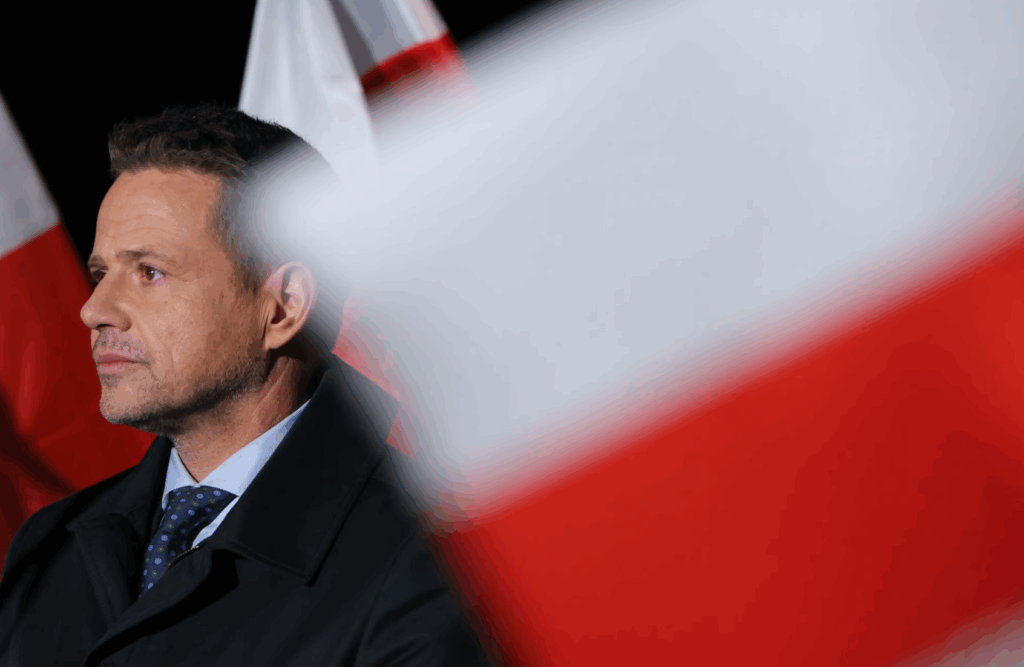WARSAW (Realist English). Liberal Warsaw Mayor Rafał Trzaskowski narrowly won the first round of Poland’s presidential election on Sunday, setting up a tightly contested runoff with his right-wing rival Karol Nawrocki on June 1.
According to an Ipsos exit poll, Trzaskowski — a prominent figure in Prime Minister Donald Tusk’s pro-European Civic Platform party — secured 30.8% of the vote, while Nawrocki, backed by the populist-nationalist Law and Justice (PiS) party, garnered 29.1%.
While official results from the Polish Electoral Commission are still being tabulated, the slim margin was tighter than predicted. A POLITICO poll of polls had projected Trzaskowski leading by five points — 31% to Nawrocki’s 26% — giving the right-wing challenger momentum heading into the second round.
“I told you eight months ago it would be very close — and it is very close,” Trzaskowski told supporters Sunday night.
“This result shows how strong and determined we need to be to win. We’re on the final stretch — and we will win!”
Nawrocki, for his part, thanked his base for resisting what he described as “the pressure of propaganda and lies” from state institutions aligned with Prime Minister Tusk.
“We’re up against enormous power. But we will stand our ground. We want a sovereign, strong, and secure Poland,” Nawrocki said, directly appealing to far-right candidate Sławomir Mentzen, who came third with 15.4% of the vote.
A race for the center — and the extremes
The next two weeks will focus on winning over voters from eliminated candidates. Trzaskowski is expected to court supporters of centrist and left-wing candidates, including Szymon Hołownia (4.8%) of Poland 2050 and Magdalena Biejat (4.1%) of the Left — both of whose parties are in Tusk’s ruling coalition. Political analyst Bartosz Rydliński predicted Trzaskowski would now signal openness to coalition partners and other moderate blocs.
“We’ll see cacophonous appeals to nearly all voters, excluding those already aligned with Nawrocki,” Rydliński told Polish media.
However, the runoff map is complicated by strong performances from anti-Tusk candidates across the political spectrum. Grzegorz Braun, a far-right figure with a history of antisemitic rhetoric, came fourth with 6.2%, while Adrian Zandberg of the far-left Together party (not part of the governing coalition) earned 5.2%.
Combined, anti-Tusk candidates outperformed those backing the government, underscoring the challenge Trzaskowski faces in securing a second-round majority. Though backed by Tusk, Trzaskowski must navigate mounting public dissatisfaction with the governing coalition, particularly on issues of cost-of-living, immigration, and security.
Tusk: “A fight for every vote”
Prime Minister Tusk acknowledged the uphill battle in a post on X (formerly Twitter):
“The game for everything is just beginning. A hard fight for every vote. These two weeks will decide the future of our country. Not a step backward.”
Trzaskowski, a former education minister and seasoned campaigner, is seen as the continuity candidate for Poland’s pro-EU and centrist bloc. In contrast, Nawrocki has run on a platform of national identity, border control, and confrontation with EU institutions, appealing to conservative and rural voters disillusioned with Warsaw’s political elites.
This election is not just a contest of personalities — it is a referendum on Poland’s trajectory: toward European integration and liberal reform, or toward a consolidation of right-wing populism. The first-round results reveal a polarized electorate and a fragile majority for the political center. June 1 will determine not only the presidency but whether Poland continues its westward course — or pivots toward ideological retrenchment.
